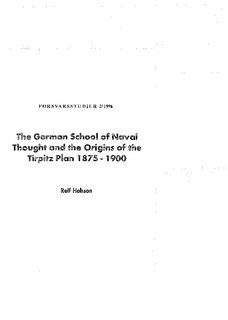| dc.description.sponsorship | This study describes the origins of the German school of naval thought. Its approach to the theory of naval warfare differed significantly from that of the British "Blue Water" school and the French Jeune école. The Prussian professionalization of military education and Clausewitz,s theories were the most important formative influences on the early German school. In the first half of the 1890s Alfred Tirpitz honed its abstract strategic axioms on the realities of modern naval warfare and Germany's defence needs to produce precisely defined operational doctrines.
During the second half of the decade these were in turn superseded by an ideology of sea power which provided a completely different interpretation of the tasks and capabilities of navies. This was chiefly derived from the works of Alfred Thayer Mahan, the third major formative influence on the German school. Out of that school grew the Tirpitz Plan, Germany's attempt to gain the status of a twentieth-century world power by building a fleet to rival Britain's. | en_US |
